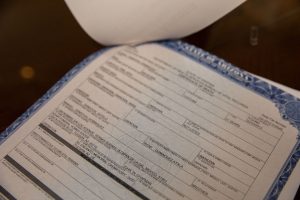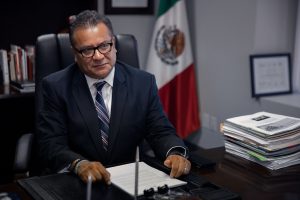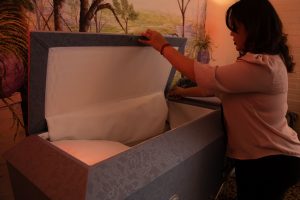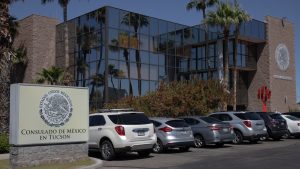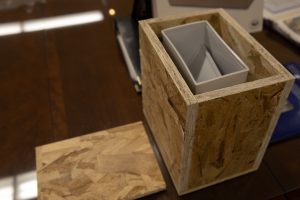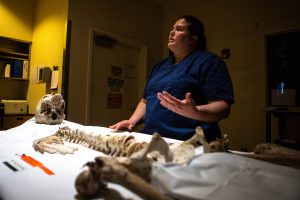- Slug: BC-CNS-BC-CNS-BC-CNS-Remains, 3300
- 6 photos (thumbnails, captions below)
By JULIAN HERNANDEZ
Cronkite News
TUCSON – Urns of all shapes, sizes and composition fill the many glass shelves lining the walls of a display room at the Adair Funeral Home Dodge Chapel.
“The American,” a brightly lacquered square made of wood, depicts U.S. military might: Fighter jets soar above Old Glory, which serves as the backdrop for the flag raising on Iwo Jima in World War II. The funeral home also sells a keg urn, made of aluminum and customizable with decals that look like beer cans, such as Budweiser, Modelo Especial or whatever brew the deceased preferred.
Many families sit down with a funeral arranger to plan services when a loved one dies.
But hundreds of other families, often impoverished and thousands of miles away in Mexico, will never step foot inside a funeral home like this or choose a fancy urn. Their loved ones died unattended, trying to cross the Sonoran Desert, and the families will have to navigate the long, expensive process of repatriating the remains by telephone.
For Janet Orozco, a funeral arranger with Adair Funeral Homes, helping families through this repatriation process is a daily reality, and one she enjoys.
In any given week, Orozco works on five to eight repatriation cases. Over the past five years at Adair Funeral Homes, she has assisted hundreds of families return the remains of their loved ones to Mexico.
Adair has a location in Orozco’s hometown of Nogales, but she still makes the hour long commute to the main Tucson funeral home, where she assists in repatriation cases referred by the Mexican Consulate in Tucson.
It’s a difficult but necessary service. Each year, dozens of migrant remains are recovered from the Sonoran Desert by the Pima County Medical Examiner’s Office after discovery by the Border Patrol, local residents or volunteers with several organizations that routinely search the unforgiving landscape of southern Arizona. Pima County adjoins about half of Arizona’s border with Mexico.
In 2017, the remains of 128 undocumented border-crossers – those who attempt to enter the United States without legal documentation – were recovered, according to a 2017 report by the Pima County Medical Examiner’s Office.
Once the remains are brought to the examiner’s office in Tucson, the difficult and time consuming work to identify them begins. But making a positive identification is never guaranteed.
“Not all of them have been identified, and not all of the cases we have been able to match through DNA,” said Ricardo Pineda, consul of Mexico in Tucson.
According to the medical examiner’s 2017 report, only 23% of the 128 migrant remains were identified.
Although authorities have identified the majority of the 2,816 remains recovered since 2000, the identification rate has been sliding in recent years. From 2000 to 2013, the rate averaged 70%. Since 2014, however, the average has dropped to 42%.
Once an identification has been made and the family notified, Monterroso said, the next step is to change a death certificate that was issued when the body was unidentified. The medical examiner issues an incomplete death certificate when human remains can’t be identified initially.
Orozco, at Adair Funeral Homes, said multiple documents are needed to change a death certificate.
“For example, they found this person a year ago and now they’re bringing that to me, so when they send it to me, that death certificate has been completed as ‘unknown,’” Orozco said.
“So now I have to go ahead and change the death certificate again, provide birth certificates, provide if this person was married, so then I need to provide a marriage license.”
Orozco said gathering all that information can be a difficult process when she does not have direct contact with the families of the deceased.
“I don’t speak with them directly, the ones that come from the consulate,” she said.
For those cases, she relies on the two person team at the consulate specifically assigned to assisting in repatriation cases.
“In my opinion, it’s better if I see and I hear the families directly because I get to hear their part and what they’re feeling,” Orozco said. “So if they have any other questions, I’m able to answer them versus if the Mexican consulate is dealing straight with the families, I can’t be in contact. I don’t know if they have any questions, any concerns.”
Pineda said the consulate is there to help families navigate the process.
“Of course we assist and orient them through the paperwork,” he said, “because in order to send the remains to Mexico, we need paperwork.”
Even with the consulate’s help, it can take weeks and up to a month for the documents to be acquired, submitted to the medical examiner’s office and then have a new death certificate issued.
Orozco said “it usually can take up to, I could probably say a month, with all that process.”
At that point, the death certificate, travel permit and disease letter are translated into Spanish, which Orozco usually does herself. She then takes the paperwork to the Arizona Secretary of State’s Tucson office where she files a request for an apostille, which certifies the documents provided to the Mexican government.
“The apostille is to go ahead and make the death certificate legitimate basically, for Mexico and other countries,” she said.
The procedure takes about 15 minutes, she said, adding, “It’s not hard. … I think it’s $3 for the apostille and they’ll give it to you right away.”
Once all the documents are in order, they’re sent to the Mexican consulate for the final step: preparing the remains for transportation.
“We take it to the Mexican consulate to have it sealed from them,” Orozco said. “After that, it’s just a process of either families taking it into Mexico on their own, or we can also facilitate a flight for them. A flight for the human remains.”
A cost few are prepared for
The cost of repatriating remains to Mexico often is beyond the means of the families.
In 2017, the average annual salary of a full-time employee in Mexico in 2017 was $8,593, according to the Organisation for Economic Co-operation and Development, an intergovernmental economic group that promotes economic growth and trade through policy.
At most funeral homes that work with the Tucson consulate to return migrant remains, the cost can reach thousands of dollars if the families choose to have the intact remains transported, which Pineda said most families prefer.
“Most of them really prefer the human remains be repatriated like that and continue with the burials and services associated with that,” he said. “It’s a tradition in Mexico. We celebrate different services in church before proceeding with the burial.”
The majority of the flights are to Mexico City, Orozco said, meaning families then have to take the remains to their final resting place.
“They do, at that point, need to contact a funeral home in Mexico and then the funeral home will go ahead and transport the body to their destination,” she said, which could add $1,000 to the final cost.
In total, a family could spend $3,000 to $4,000 to bury their loved one. For the average family in Mexico, that could mean spending multiple months of income.
A cremation service saves on transportation costs. The flight would cost $100 to $300 and the cremation service would be $647.
“Cremation is always the best way cost-wise, as I see it,” Orozco said.
Providing when possible
Families who work through the consulate can get help paying for repatriation.
Pineda said the Mexican government has a history of assisting families bringing their loved ones home.
“As consular centers from Mexico, we started this program from the very beginning, decades ago,” he said.
In the late 1990s, the Tucson consulate noticed a rise in deaths in the desert. In 1998, it set up its program and formally outlined how it would request funding from the Mexican government for the repatriation assistance.
“From 1998 up to now, we have more than 2,500 deaths registered in the Tucson corridor, so we need to be, because of these regrettable happenings, conscious that our community need this service,” Pineda said.
The Mexican government has not set a specific amount of financial assistance for repatriation. When it comes to how much funding each consulate receives, he said, “Everything is on a case-by-case basis.”
“Sometimes we have 20 cases, 15 cases. It depends.”
Pineda said the consulate can spend $15,000 to $25,000 a month assisting with repatriation costs, but the majority of requests for repatriation assistance come from Mexican families in the U.S. who wish to keep with family traditions of burying loved ones in Mexico.
Of the migrant remains identified as Mexican nationals by the Pima County Medical Examiner’s Office in 2017, Pineda said, about half were repatriated back to Mexico.
“In some other cases, they have family here in the U.S. and the remains stay in the U.S.,” Pineda said.
Regardless of who has requested assistance from the consulate, it can pay up to $1,500 of the total cost.
“In the past, we were able to fund the whole bill,” Pineda said, but resources available are limited.
Pineda acknowledges the burdens families face to repatriate remains but said the consulate will help wherever possible.
“The whole Mexican government, the 32 states, also have specific areas of attention to migrants that provides services to them,” he said. “Sometimes they just provide information, but in the majority of cases, they have funding to help the families recover the human remains.”
Helping families through the emotional ordeal can be difficult, but Pinada said staff members at the consulate are proud of their work.
Orozco is grateful for being able to help the many Mexican families she interacts with every year.
“This job, it gave me the opportunity to help other people, my own people,” she said.
^__=
Lindsay Hairston is the morgue supervisor and unidentified persons coordinator at the Pima County Medical Examiner’s Office. Hairston oversees the remains of all unidentified migrants and assists in the identification process so the bodies can be shipped back home to Mexico. (Photo by Meg Potter/Cronkite News)
